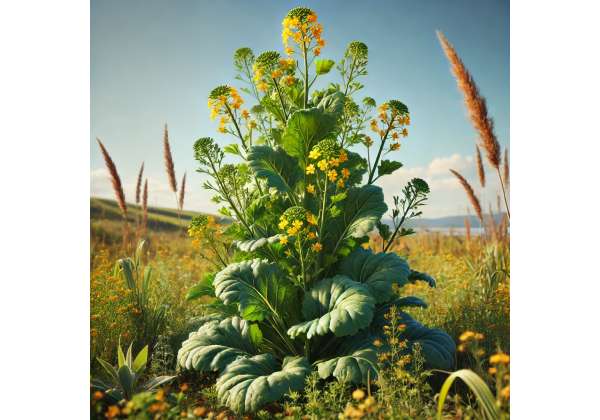Black Mustard, scientifically known as Brassica nigra, is a pungent and vibrant plant native to the Mediterranean region and parts of Asia. Celebrated for its bold flavor and numerous health benefits, Black Mustard has been a staple in culinary and medicinal practices for centuries. This comprehensive guide delves into the botanical characteristics, historical significance, active compounds, health benefits, usage methods, safety guidelines, and the latest scientific research surrounding Black Mustard. Whether you’re a culinary enthusiast, a health-conscious individual, or someone interested in natural remedies, this guide offers valuable insights into the multifaceted applications of Black Mustard.
Detailed Botanical Profile of Black Mustard (Brassica nigra)
Black Mustard belongs to the Brassicaceae family, which also includes other well-known plants like cabbage, broccoli, and radishes. This annual herb typically grows between 1 to 3 feet in height, boasting slender stems and small, serrated leaves that are rich green in color. The plant produces clusters of bright yellow flowers during the spring and summer months, which eventually give way to round, brown seed pods containing tiny, dark seeds—the prized component of the plant.
Habitat and Growth Conditions
Black Mustard thrives in a variety of environments, including temperate regions, gardens, and agricultural fields. It prefers well-drained, fertile soil and can adapt to both full sun and partial shade. The plant is known for its rapid growth, often colonizing disturbed soils and open areas with ease. Due to its resilience, Black Mustard is commonly cultivated for both its culinary seeds and its utility in crop rotation practices to improve soil health.
Reproductive Cycle
Black Mustard reproduces primarily through its seeds. The plant flowers in late spring, producing yellow blooms that attract a variety of pollinators, including bees and butterflies. After pollination, the flowers develop into seed pods that mature by late summer. These pods burst open when dry, dispersing the seeds into the surrounding environment. Additionally, Black Mustard can self-seed, ensuring its propagation year after year without the need for extensive cultivation.
Tracing the Historical Significance of Black Mustard in Culinary and Medicinal Practices
Black Mustard has a storied history that spans centuries and continents, playing a significant role in both culinary and medicinal traditions.
Culinary Uses in Ancient and Modern Cultures
In ancient civilizations, Black Mustard seeds were prized for their sharp, spicy flavor, which was used to enhance the taste of various dishes. The seeds were often ground into a paste and used as a condiment, similar to modern-day mustard. In medieval Europe, Black Mustard was a common ingredient in sauces, pickles, and preserved foods, providing not only flavor but also a means of preservation due to its antimicrobial properties.
Today, Black Mustard seeds are widely used in cuisines around the world. They are essential in Indian, Middle Eastern, and European cooking, adding depth and heat to curries, marinades, and dressings. Black Mustard oil, extracted from the seeds, is utilized in frying, as a salad dressing, and in traditional medicinal preparations.
Medicinal Applications in Traditional Practices
Black Mustard has been utilized in traditional medicine systems for its therapeutic properties. Ancient Greek physicians, including Hippocrates, recommended Black Mustard for treating respiratory ailments, digestive issues, and muscular pain. In Ayurvedic medicine, Black Mustard is considered warming and is used to stimulate circulation, relieve congestion, and alleviate muscle stiffness.
Native American tribes also incorporated Black Mustard into their healing practices, using the seeds and oil to treat wounds, reduce inflammation, and enhance overall vitality. The plant’s ability to promote detoxification and support the immune system made it a valuable resource in maintaining health and combating illnesses.
Evolution of Black Mustard’s Use Over Time
With the advent of modern medicine and agricultural practices, the widespread use of Black Mustard in traditional remedies declined. However, the resurgence of interest in natural and holistic health practices has reignited appreciation for its medicinal potential. Contemporary herbalists and naturopaths continue to explore and utilize Black Mustard in various formulations, blending ancient wisdom with modern scientific understanding to harness its health benefits.
Active Compounds and Phytochemistry of Black Mustard
The therapeutic and culinary benefits of Black Mustard are largely attributed to its rich phytochemical profile. Understanding the active compounds within the plant provides insight into its medicinal properties and applications.
Glucosinolates and Isothiocyanates
Black Mustard seeds are high in glucosinolates, particularly sinigrin, which upon enzymatic hydrolysis produce isothiocyanates such as allyl isothiocyanate (AITC). These compounds are responsible for the pungent flavor of Black Mustard and possess potent antimicrobial and anticancer properties. Isothiocyanates have been extensively studied for their role in promoting detoxification enzymes and inhibiting the growth of cancer cells.
Essential Oils
Black Mustard seeds contain essential oils that contribute to their aromatic and medicinal qualities. The primary components include myristicin, eugenol, and linalool, which exhibit anti-inflammatory, analgesic, and antimicrobial effects. These oils are often extracted and used in aromatherapy and topical applications to alleviate pain and prevent infections.
Flavonoids and Phenolic Compounds
Flavonoids such as quercetin and kaempferol, along with phenolic acids like caffeic and ferulic acid, are abundant in Black Mustard. These compounds are powerful antioxidants that help neutralize free radicals, reduce oxidative stress, and support overall cellular health. Their anti-inflammatory properties also contribute to the herb’s ability to alleviate chronic inflammation and related conditions.
Vitamins and Minerals
Black Mustard is a source of essential vitamins, including vitamin C, vitamin A, and various B vitamins. It also contains vital minerals such as potassium, calcium, magnesium, and iron, which are crucial for maintaining bone health, muscle function, and overall metabolic processes. These nutrients enhance the herb’s role in promoting immune health and supporting bodily functions.
Saponins and Triterpenoids
Saponins present in Black Mustard contribute to its cholesterol-lowering and immune-boosting effects. Triterpenoids, including betulinic acid and ursolic acid, add to the plant’s anti-inflammatory and anticancer properties, making Black Mustard a valuable addition to natural health remedies.
Comprehensive Health Benefits of Black Mustard Supported by Research
Black Mustard offers a multitude of health benefits, many of which are backed by scientific research. Incorporating this versatile herb into your wellness routine can contribute to overall health and well-being in several ways.
Anti-Inflammatory and Pain-Relieving Properties
Black Mustard’s anti-inflammatory compounds, such as isothiocyanates and flavonoids, help reduce inflammation in the body. These properties make it effective in alleviating pain associated with arthritis, muscle soreness, and joint stiffness. Topical applications of Black Mustard oil can provide targeted relief, while oral consumption supports systemic anti-inflammatory effects.
Antioxidant Protection and Cellular Health
The high antioxidant content in Black Mustard combats oxidative stress, which is linked to aging and numerous chronic diseases. Antioxidants neutralize free radicals, protecting cells from damage and supporting overall health. Regular intake of Black Mustard can contribute to enhanced cellular function and reduced risk of oxidative-related illnesses.
Respiratory Health Support
Black Mustard is traditionally used to treat respiratory ailments such as coughs, bronchitis, and asthma. Its expectorant properties help loosen and expel mucus from the airways, providing relief from congestion and facilitating easier breathing. The herb’s anti-inflammatory effects also help reduce airway inflammation, alleviating symptoms of chronic respiratory conditions.
Digestive Health Benefits
Black Mustard promotes healthy digestion by stimulating digestive enzymes and improving gut motility. It can help alleviate issues such as indigestion, bloating, and constipation. The carminative properties of the herb soothe the gastrointestinal tract, reducing discomfort and enhancing overall digestive function.
Immune System Enhancement
The immunomodulatory properties of Black Mustard help strengthen the immune system. By regulating immune cell activity, Black Mustard enhances the body’s ability to fight off infections and reduce the risk of autoimmune diseases. Its antimicrobial properties also aid in preventing and controlling infections caused by bacteria, viruses, and fungi.
Cardiovascular Health Improvement
Black Mustard has been linked to improved cardiovascular health by lowering blood pressure and reducing cholesterol levels. The herb’s ability to regulate lipid profiles contributes to a reduced risk of heart disease and supports overall heart function. Additionally, the potassium content in Black Mustard aids in maintaining healthy blood pressure levels.
Antimicrobial and Antiviral Properties
Black Mustard exhibits strong antimicrobial activity against a variety of pathogens, including bacteria, fungi, and viruses. This makes it effective in preventing and treating infections, particularly those that are resistant to conventional antibiotics. Its antimicrobial properties also contribute to its use as a natural preservative in food, enhancing food safety and shelf life.
Neuroprotective Benefits
Emerging research suggests that Black Mustard may have neuroprotective properties, potentially mitigating the effects of neurodegenerative diseases such as Alzheimer’s and Parkinson’s. The herb’s antioxidant and anti-inflammatory compounds help reduce oxidative stress and inflammation in the brain, preserving cognitive function and neuronal health.
Skin Health and Wound Healing
Topical applications of Black Mustard extracts can promote skin health by reducing inflammation, preventing infections, and accelerating wound healing. It is effective in treating conditions such as eczema, psoriasis, and minor cuts or abrasions. The antimicrobial properties of Black Mustard help in preventing skin infections, while its anti-inflammatory effects soothe irritated skin.
Weight Management Support
Black Mustard may aid in weight management by boosting metabolism and reducing appetite. Its natural compounds help regulate body weight and support healthy metabolic processes, making it a valuable addition to weight loss and maintenance programs. The herb’s ability to enhance digestion and promote fat oxidation contributes to effective weight management strategies.
Liver Detoxification
Black Mustard supports liver health by enhancing detoxification processes and protecting liver cells from toxins. This contributes to improved liver function and overall metabolic health, aiding in the elimination of harmful substances from the body. The herb’s antioxidant properties also help protect the liver from oxidative damage, ensuring its optimal performance.
Anti-Cancer Potential
Preliminary studies indicate that certain compounds in Black Mustard, such as isothiocyanates and triterpenoids, may possess anti-cancer properties. These compounds can inhibit the growth of cancer cells and induce apoptosis (programmed cell death), offering potential avenues for cancer treatment. While more research is needed, the early findings are promising and highlight the herb’s potential in oncology.
Effective Methods of Preparing and Using Black Mustard
Incorporating Black Mustard into your daily routine can be both enjoyable and beneficial. Here are several effective methods to prepare and use this versatile herb:
Culinary Applications: Enhancing Flavor and Nutrition
Black Mustard seeds are a staple in many cuisines, adding a distinctive heat and depth of flavor to dishes. They can be used whole or ground to create mustards, sauces, marinades, and pickles. In Indian cuisine, Black Mustard seeds are often tempered in hot oil to release their flavor before adding to curries and dals. Ground Black Mustard can be mixed with vinegar or other liquids to create a tangy mustard paste, perfect for sandwiches and dressings.
Mustard Oil: A Versatile Cooking and Medicinal Oil
Extracted from Black Mustard seeds, mustard oil is widely used in cooking for frying, sautéing, and as a salad dressing. Its robust flavor enhances the taste of various dishes, while its health-promoting properties contribute to overall wellness. Mustard oil can also be used topically to massage sore muscles, improve circulation, and promote hair health, making it a valuable addition to both the kitchen and personal care routines.
Herbal Teas and Infusions: Soothing and Therapeutic Beverages
Black Mustard leaves and seeds can be steeped in hot water to create herbal teas and infusions. These beverages are known for their soothing effects on the digestive and respiratory systems. Adding honey or lemon can enhance the flavor and provide additional health benefits, such as antimicrobial and antioxidant properties. Herbal teas made from Black Mustard are an excellent way to incorporate the herb’s health benefits into your daily routine.
Tinctures and Extracts: Concentrated Forms for Targeted Health Support
Black Mustard tinctures and extracts offer a concentrated form of the plant’s active compounds. These can be taken orally using a dropper, allowing for precise dosage and easy incorporation into your wellness regimen. Tinctures are particularly useful for targeting specific health concerns, such as respiratory issues or digestive discomfort, providing a convenient and effective means of harnessing the herb’s benefits.
Topical Applications: Promoting Skin and Muscle Health
Black Mustard extracts and essential oils can be applied topically to the skin to promote healing and reduce inflammation. They can be mixed with carrier oils such as coconut or jojoba oil and used as a massage oil or as part of a skincare routine. Topical applications of Black Mustard are effective in treating conditions like acne, eczema, and minor wounds, as well as relieving muscle soreness and joint pain.
Capsules and Supplements: Convenient Daily Health Support
For those seeking a convenient way to consume Black Mustard, capsules and dietary supplements are available. These provide a standardized dosage of the herb’s beneficial compounds, making it easier to incorporate into daily health regimens. Supplements are particularly useful for individuals looking to support specific health functions, such as immune health, digestion, or cardiovascular wellness.
Infused Oils and DIY Remedies: Creative and Personalized Health Solutions
Infusing Black Mustard seeds or leaves in oils creates a versatile product that can be used for both culinary and medicinal purposes. Infused oils can be used in cooking, as salad dressings, or applied topically for their skin and hair benefits. Additionally, Black Mustard can be used to create various homemade remedies, such as poultices for wound healing or balms for muscle aches. DIY remedies offer a personalized approach to utilizing the herb’s therapeutic properties.
Recommended Dosage and Safety Guidelines for Black Mustard
While Black Mustard offers numerous health benefits, it is essential to use it responsibly to ensure safety and efficacy. Adhering to recommended dosages and understanding potential interactions can help maximize its benefits while minimizing risks.
Suggested Dosages
- Culinary Use: Incorporate 1-2 teaspoons of Black Mustard seeds into your daily diet through cooking and seasoning.
- Mustard Oil: Use 1-2 tablespoons of mustard oil for cooking or topical applications, depending on the intended use.
- Herbal Teas and Infusions: Consume 1-2 cups daily, prepared by steeping 1-2 teaspoons of dried Black Mustard leaves or seeds in hot water.
- Tinctures and Extracts: Follow the manufacturer’s instructions, typically ranging from 20-40 drops diluted in water or juice, taken 2-3 times daily.
- Capsules and Supplements: Common dosages range from 500 mg to 1,000 mg per day, divided into two or three doses. Always adhere to the recommended serving size on the product label.
- Topical Applications: Apply a few drops of Black Mustard oil mixed with a carrier oil to the affected area 2-3 times daily for skin conditions or muscle pain.
Safety Precautions
- Allergic Reactions: Some individuals may experience allergic reactions to Black Mustard. It is advisable to perform a patch test before using topical applications and to consult a healthcare provider before oral consumption if you have known allergies.
- Pregnancy and Breastfeeding: Pregnant or breastfeeding women should consult their healthcare provider before using Black Mustard supplements or extracts, as safety has not been fully established in these populations.
- Medication Interactions: Black Mustard may interact with certain medications, including blood thinners, diabetes medications, and immunosuppressants. Consult a healthcare professional if you are taking any prescription medications.
- Overconsumption Risks: Excessive intake of Black Mustard can lead to adverse effects such as digestive discomfort, dizziness, or headaches. Stick to recommended dosages to avoid potential side effects.
Special Considerations
- Children: Use caution when administering Black Mustard to children. Consult a pediatrician for appropriate dosages and formulations tailored to younger individuals.
- Pre-existing Health Conditions: Individuals with chronic health conditions, such as liver or kidney disease, should seek medical advice before incorporating Black Mustard into their health regimen.
- Surgical Procedures: Black Mustard may affect blood sugar levels and blood clotting. Discontinue use at least two weeks before scheduled surgery and inform your surgeon about all herbal supplements you are taking.
Cutting-Edge Research and Recent Studies on Black Mustard
The scientific exploration of Black Mustard continues to unveil its potential health benefits and applications. Recent studies have delved into various aspects of the herb’s medicinal properties, providing a deeper understanding of its mechanisms and efficacy.
Advances in Cancer Research
Recent in vitro and animal studies have demonstrated that compounds found in Black Mustard, such as isothiocyanates and triterpenoids, can inhibit the growth of cancer cells and induce apoptosis (programmed cell death). These findings suggest potential applications in cancer therapy, although more clinical trials are necessary to confirm efficacy and safety in humans.
Breakthroughs in Diabetes Management
Studies have shown that Black Mustard supplementation can improve insulin sensitivity and lower blood glucose levels in individuals with type 2 diabetes. These effects are attributed to the herb’s ability to enhance glucose uptake and regulate metabolic pathways, offering a promising natural adjunct to conventional diabetes treatments.
Neuroprotective Research
Emerging research indicates that Black Mustard may have neuroprotective properties, potentially mitigating the effects of neurodegenerative diseases such as Alzheimer’s and Parkinson’s. The herb’s antioxidant and anti-inflammatory compounds help reduce oxidative stress and inflammation in the brain, preserving cognitive function and neuronal health.
Cardiovascular Health Studies
Clinical trials have revealed that Black Mustard can significantly reduce blood pressure and improve lipid profiles by lowering LDL cholesterol and increasing HDL cholesterol. These cardiovascular benefits contribute to a reduced risk of heart disease and support overall heart health.
Antimicrobial and Antiviral Investigations
Black Mustard has been shown to possess strong antimicrobial and antiviral properties, effective against a range of pathogens including antibiotic-resistant bacteria and certain viruses. This makes it a valuable candidate for developing natural antimicrobial agents and enhancing infection control measures.
Gut Microbiome Enhancements
Research into the gut microbiome has highlighted that Black Mustard can positively influence the composition of gut bacteria, promoting the growth of beneficial microorganisms. This contributes to improved digestive health, enhanced nutrient absorption, and a stronger immune system.
Inflammatory Pathway Modulation
Studies have elucidated the molecular mechanisms through which Black Mustard exerts its anti-inflammatory effects. By modulating key inflammatory pathways and cytokine production, Black Mustard helps reduce chronic inflammation, which is a common underlying factor in many chronic diseases.
Clinical Trials on Immune Function
Ongoing clinical trials are assessing the impact of Black Mustard on immune system modulation, particularly in individuals with autoimmune diseases and immune deficiencies. Preliminary results suggest that Black Mustard can enhance immune responsiveness and reduce the incidence of infections.
Seven Fascinating Facts About Black Mustard You Might Not Know
- Ancient Spice Heritage: Black Mustard has been used as a culinary spice since ancient times, with evidence of its use dating back to ancient Egypt and Greece. It was prized not only for its flavor but also for its preservative qualities in food storage.
- Natural Dye Source: The seeds of Black Mustard can be used to produce natural dyes, offering a sustainable alternative to synthetic dyes in textile production. The vibrant yellow hue derived from the seeds is used in fabric coloring and art.
- Agricultural Benefits: Black Mustard is often used as a cover crop in agriculture to improve soil health. Its deep root system helps prevent soil erosion, suppress weeds, and enhance soil fertility by fixing nitrogen.
- Ecological Importance: As a flowering plant, Black Mustard attracts a variety of pollinators, including bees and butterflies, contributing to local biodiversity and ecosystem health.
- Culinary Innovations: Modern chefs are experimenting with Black Mustard in gourmet dishes, incorporating its seeds and oils into innovative recipes such as artisanal mustards, dressings, and even desserts, adding a unique spicy kick to culinary creations.
- Cultural Symbolism: In some cultures, Black Mustard symbolizes strength and resilience. It is often used in traditional ceremonies and rituals to promote health and well-being.
- Sustainable Packaging: Black Mustard seeds are biodegradable and can be used in the production of eco-friendly packaging materials, reducing the environmental impact of packaging waste.
Disclaimer
The information provided in this article is for informational purposes only and is not intended as a substitute for professional medical advice, diagnosis, or treatment. Always seek the advice of your healthcare provider with any questions you may have regarding a medical condition or before starting any new treatment.
If you found this guide on Black Mustard insightful and helpful, please share it with your friends and family to spread the word about this incredible herb. Use our Facebook and X (formerly Twitter) share buttons below or share via your preferred social media platforms. Together, we can promote better health and well-being for everyone!













